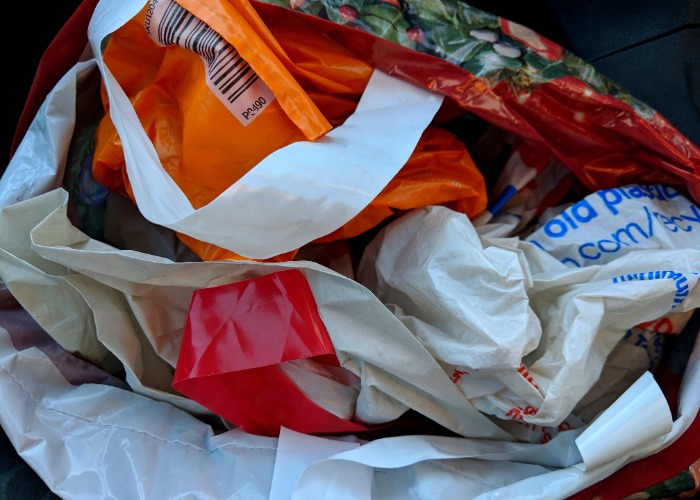Supermarket rip-offs: bags for life, misleading prices, and more

Supermarkets use a wide range of tactics to squeeze more cash out of hard-pressed households. Here are five of the sneakiest.
Have you ever left the supermarket having spent more than you were planning?
Then, you may have fallen into one of the cleverly designed traps supermarkets employ to maximise their profits.
From flogging out-of-date food to misleading pricing strategies, we look at five techniques the supermarket giants use to convince us to part with our cash.
1. Cashing in on 'bags for life'
There is no denying that single-use plastic bags are harmful to the environment and dangerous for wildlife.
However, the policy of charging customers every time they purchase a bag has opened up another avenue from which the supermarket giants can profit.
First introduced by the Government in 2015, the plan to cut down on single-use bags initially involved imposing a 5p charge on every bag.
The Government also issued guidance encouraging supermarkets to donate any profit to charities, and particularly environmental causes.
However, the initiative has now become a huge money-maker for supermarkets.
That's because they stopped offering single-use bags and flogging so-called ‘bags for life’ instead.
These fall into a different category from single-use bags, meaning supermarkets can keep any profit from the sale of these items.
We don't have any up-to-date stats on this but, in 2019, figures from the Environmental Investigation Agency and Greenpeace found that Brits bought 1.58 billion ‘bags for life’ that year, which works out to 57 per household.
Assuming a sale price of 30p per bag, that works out to shoppers spending £474 million on these bags in the space of 12 months.
And the price of these bags just keeps rising.
Both Sainsbury's and Tesco hiked the price of their offering from 30p to 40p late last year.
2. Selling out-of-date food
A new survey by retail industry organisation GS1 UK has found that more than half (51%) of us have unknowingly bought out-of-date food from a supermarket.
We've seen numerous high-profile examples of this: in July, Asda was fined £640,000 for selling out-of-date food at two stores in the UK.
Trading Standards officers found as many as 115 expired items at the supermarket's branches in Leckwith and Pentwyn in 2024.
Asda is by no means the only one to have been found out for doing so: Tesco was fined £7.5 million in 2021 for selling out-of-date food, with others also caught out over the years.
Be sure to check the dates on goods before buying to avoid losing out or, worse, getting ill.
3. Confusing pricing strategies
When you’re comparing prices on your weekly shop, the only way to know if you’re getting value for money is by comparing like-for-like.
However, supermarkets don’t always make it easy for us, thanks to a misleading practice known as ‘inconsistent unit pricing’.
Under this sneaky tactic, a retailer may use different units when displaying the prices of similar items, which makes it difficult for us to tell which products offer the best value.
As part of an investigation last year, the Competition and Markets Authority (CMA) looked at pricing practices across 11 supermarkets and identified what it described as “unhelpful inconsistencies”, which “leave too much scope for interpretation”.
For example, prices for tea bags may be given per bag on some products, with other products labelled as price per 100g.
Likewise, some retailers failed to display prices per unit for items on sale.
In fact, the CMA was so concerned about these misleading practices that it has made recommendations for the Government to reform its legislation on unit pricing.
Cheapest supermarket home deliveries
4. Loss leaders
A loss leader is where a supermarket sells a small number of products for a loss with the aim of boosting sales of more profitable items.
In one of the most common examples, supermarkets often sell essential items such as eggs or bread at a loss in order to lure shoppers into the store or onto their website.
While it obviously means you can get a good deal on one item, it often leads to shoppers spending on more profitable items as well.
Supermarkets don't reduce prices out of charity: it's clearly a profitable strategy for them.
5. Frequently rearranging aisles
It won’t come as a surprise to many that supermarkets often use the layouts of their stores to induce us to spend more.
For example, it’s common knowledge most supermarkets place their most expensive items at eye level.
Likewise, most of us are familiar with the idea that supermarkets often place toys on lower shelves so they are within easy reach of children.
But have you ever wondered why your supermarket so regularly changes the location of many staple items?
Put simply, it’s in a supermarket’s best interest for its customers to get a little lost and disorientated.
The more time you spend wandering through the aisles, the more likely you are to fill your trolley with things that weren’t originally on your shopping list.
How to boost your Tesco Clubcard points
Have your say
Are there any supermarket tricks that you find particularly infuriating? Let us know in the comments below.
Comments
Be the first to comment
Do you want to comment on this article? You need to be signed in for this feature